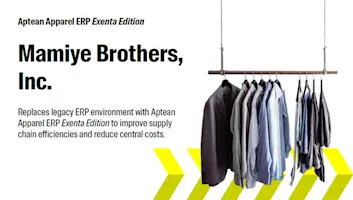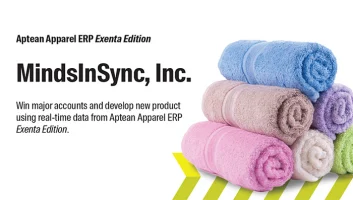Aptean Apparel PLM Case Study: ADPL
Aptean Apparel PLM Case Study: ADPL
Aptean Apparel PLM Case Study: ADPL
15 Oct 2021
Headline
- ADPL Efficiently Handles Order Surge With Aptean Apparel PLM Software
ADPL, LLC specializes in women’s clothing lines including dresses, career wear and t-shirts. The company designs products and handles execution of placing orders with production vendors for Dillard’s private label brands such as Antonio Melani, Gianni Bini, Preston & York and Alex Marie.
The company has six brand teams and approximately 95 employees in total, including about 40 designers, tech designers and product development professionals.
The Challenge
In the past, the design and product development process at ADPL varied from one design team to the next. When tech packs became a standard in the fashion industry, the company still maintained in-house pattern makers while adopting to the new technology.
Molly Monarchio, Senior Knitwear Designer commented, “Some design teams relied heavily on hand sketches, on paper, while others relied more heavily on technical sketches using Adobe suite. Additionally, depending on where a design would be developed, some tech packs were written by hand. The format of tech packs also varied between design teams from the layout to the program using tech pack.”
The organization was facing many challenges:
Many aspects of design and development were manual, and some were paper-based with limited visibility
COVID-19 shutdowns leading to designers working from home
Changing consumer preferences during the pandemic
Information silos and a lack of transparency
“Before Aptean Apparel PLM, it used to be a struggle for me to not have the transparency of seeing what my teammates on the same division were designing for the same season. We’d have to schedule a meeting, print out papers and find the time to get together and review each other’s work.”
The Solution
In an effort to gain better organization and streamline processes, ADPL began searching for a product lifecycle management (PLM) solution that would enable teams to track the development process and also manage production orders sent to factories on behalf of Dillard’s.
To fulfill these requirements, the company selected Aptean’s apparel PLM software. Specifically designed for fashion companies, the system helps ADPL streamline and automate key processes such as line management, design, sample tracking, tech pack development, sourcing and costing.
ADPL chose Aptean Apparel PLM because it’s a cloud-based PLM solution that would empower its design teams to use it anywhere with a secure internet connection—a fact that became critically important during the COVID-19 pandemic, when designers and product management worked from home.
“Aptean Apparel PLM definitely made transitioning from office to home much easier as all the information we needed to reference was stored on the PLM cloud. Honestly, I really don’t know if I would have been able to do the job that I did during COVID-19 lockdown without Aptean Apparel PLM.”
The Results
1. Enhanced Productivity During Pandemic Demand Surge
Aptean’s cloud-based PLM system enabled ADPL design teams to work from home during the early days of the pandemic when workplace shutdown was mandated. Because all the files were stored in the cloud, the designers were able to maintaining good productivity and quickly adapt to changing customer demand and increasing order volume—all while working from home.
The combination of rapid line shifts, changing demand and reduced staff capacity could have presented an insurmountable challenge to ADPL’s designers had they not been able to work so efficiently in the cloud. The software empowered the organization to:
Streamline processes that brought consistency and real-time visibility across design teams
Automate key processes and continues to improve collaboration among designers under a hybrid work model
Automate tech pack creation that increased overall efficiency
The efficiency and automation delivered by Aptean’s apparel PLM helped turbocharge the product lifecycle, reducing the time required to develop a new product or make changes to existing ones—helping ADPL capitalize on the surging demand.
“Reviewing our Gianni Bini division and comparing pre-COVID orders to our first market presentation after the start of COVID, we saw a 189% uptick in knitwear orders on this brand after the start of COVID. These orders had to be handled for production with a design team working at reduced capacity of 40% to as much as 80% during lockdowns,” said Monarchio.
2. Faster and Easier Collaboration
Not only does Aptean Apparel PLM increase transparency between design teams, it also eliminates communication siloes within teams between designers and tech, making it easier to tweak and improve products. Now, the team can set automatic alerts to notify design if tech changes something, rather than having to email callouts.
Michelle Heyman, Senior Technical Designer at ADPL noted, “Designers are able to ‘ping’ me with any changes and additions easily. Inspiration details are attached for each style with links to websites. Sharing information through Aptean Apparel PLM is much easier than our old manual ‘pass off’ of sketches.”
“The organizational power that PLM provides is my favorite part. Before PLM, assistants were responsible for all of the organization, but now a lot of their time is freed up. They have a greater ability to help you design and to take ownership over new things. Sharing the responsibility definitely allows for more time to design while keeping everything more organized than it ever has been.”
3. Improved Vendor Communication
Aptean Apparel PLM features integrated comments so designers can communicate amongst themselves, with other employees, and even with customers and vendors without leaving the system. This keeps a record of communications within the PLM software, rather than a separate email system.
This means ADPL design teams can get information overseas more quickly. As things change, designers can go back to the sample request and make changes, giving the factory instant access to those changes. Overseas factories can upload images along with measurements instead of having to print hard copies and mail them back to New York.
This became critically important during the pandemic, when many international packages were embargoed and delayed under COVID-19 restrictions. According to Heyman, her team was able to review photos online and approve proceeding on to showroom samples, especially for styles based off previous designs she knew had worked well before.
“Everything is in one place from development through production,” Heyman noted. “Communication in Aptean Apparel PLM messaging keeps everything together and reduces the e-mail madness for day-to-day follow up—especially sample status for development samples. Also, the communication with sales to get feedback from buyers is easier by PLM message rather than e-mail.”
Overall, ADPL realized that leveraging Aptean PLM system, in addition to Aptean’s enterprise resource planning (ERP) system generated a large and positive impact during the challenging times of the pandemic. Efficiency gains have already enabled the company’s designers and tech designers to complete more work, and the software is also opening up additional cost savings in terms of either reducing headcount or the ability to grow in the future without hiring new employees.
Dress Your Organization for Success With Aptean Apparel PLM Software
Choosing Aptean’s cloud-based apparel PLM system streamlines your entire product lifecycle, empowering you to foster team collaboration, reduce costs and accelerate time to market. And, because our software was designed specifically for fashion and apparel businesses, you know you’ll have access to the functionality you need straight out of the box—so you can start driving profitability as soon as possible.
What’s more, our full suite of apparel software—from our apparel ERP to our shop floor control software—offers specialized functionality that allows you to optimize your entire operation from end to end.
Ready to start boosting your business? Check out the success stories of our apparel customers or get in touch with our team today to set up your quick product demo to see the software in action.
Related Content





Ready to start transforming your apparel business?
We’ve got the specialised PLM solutions you need to conquer your fashion industry challenges.



